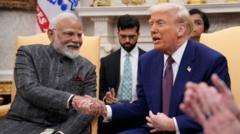India's Prime Minister Narendra Modi and US President Donald Trump convened in Washington, heralding what Modi described as a "mega partnership" between the two nations. The discussions primarily revolved around increasing India's imports of American oil and gas, aiming to alleviate trade tensions as both countries grapple with tariff challenges.
During the two-day visit, Trump remarked on India's high trade tariffs, labeling them a substantial issue in bilateral trade relations. Modi sought to mitigate the looming trade barriers by expressing his willingness to consider lowering tariffs on US goods, ensuring the repatriation of undocumented Indian nationals, and investing in military procurement, including fighter jets from the US.
At their joint press briefing, Modi adapted Trump’s campaign slogan, stating, "It's Make India Great Again - Miga," promoting the idea of a combined ethos of growth with the term "Mega partnership for prosperity." Trump emphasized the significance of the energy agreement, asserting, "They need it. And we have it," highlighting India's reliance on imported oil.
Economic analysts pointed out that enhancing energy ties with the US could yield significant benefits while urging caution regarding the potential impact of the stronger dollar on oil prices for India. Among the other focal points of discussion were military sales, with the US poised to increase its military hardware exports to India significantly, including prospective F-35 fighter jets.
The two leaders also addressed immigration—a contentious issue affecting bilateral relations. Trump announced the extradition of a suspect linked to the 2008 Mumbai terror attacks, which Modi welcomed, while also agreeing to accept back Indian nationals who entered the US illegally. This came in the wake of a recent mass deportation of illegal Indian immigrants.
Despite the positive overtures, Trump's recent directives proposing broad new tariffs on US trading partners raised concerns that reciprocal measures might follow from India. Trump's assertion that "our allies are worse than our enemies" underscored the skepticism towards established trade relationships.
The backdrop of this meeting involves a burgeoning trade deficit, with Trump criticizing India's tariffs—averaging significantly higher than the US—and the need for recalibrated trade dynamics, as he previously imposed tariffs on imports from China and considered similar actions against Canada and Mexico.
This meeting represents a critical juncture for US-India relations, balancing cooperation on economic fronts while navigating the complexities of trade policy and immigration.




















